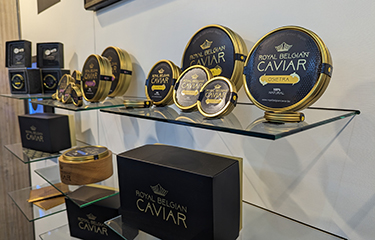The talk of caviar companies at the 2023 Seafood Expo Global was a U.S. proposal to institute a blanket ban on the product – even if it was raised via aquaculture.
The proposal in question was first posted by the U.S. Fish and Wildlife Service on 25 May, 2022. The central tenant of the proposal is reclassifying four species of sturgeon as endangered species: Russian sturgeon (Acipenser gueldenstaedtii), ship sturgeon (A. nudiventris), Persian sturgeon (A. persicus), and stellate sturgeon (A. stellatus). If fully finalized, the rule would make importing, exporting, taking, possessing, or other actions related to the four species illegal and would prohibit “delivery, receipt, carriage, transport, or shipment in interstate or foreign commerce.”
The problem, multiple companies told SeafoodSource during the expo in Barcelona, Spain, is that the proposal does not differentiate in any way between products produced sustainably via aquaculture and products caught in the wild through poaching. The rule would put restrictions on the species “wherever found,” meaning all commerce related to sturgeon would be banned the U.S.
“It was the hot topic,” Royal Belgian Caviar Key Account Manager Raymond Tanghe told SeafoodSource. “We talked about it with several producers.”
Several caviar companies, he said, have been working to form a coalition of people who have accumulated information and studies to counter any narrative that the caviar-farming industry is causing harm to wild sturgeon populations.
“The different distributors formed a group, where our biologist was looking up all the peer-reviewed publications looking at aquaculture releasing sturgeon in the wild and doing so with success,” Tanghe said.
Multiple caviar companies from Belgium, Italy, France, and more, all raise and release sturgeon roe into rivers to help rebuild the endangered populations – a process that would be hampered if the huge U.S. market for caviar was suddenly cut off.
Aquatir Caviar Head of Trade Sergey Yakovlev told SeafoodSource that the company doesn’t think it’s fair to completely close the market when caviar companies across Europe have been following the rules – including being registered in the convention on international trade of endangered species (CITES).
“We replenish the broodstock of sturgeon on our river,” Sergey said. “We think that that’s not quite fair to close the market, especially if most of those companies obey all the rules and take part in ecological projects.”
Some of the companies most-threatened by a ban in the U.S. are located in China. Frosista Caviar General Manager Fu Wengyan told SeafoodSource his company's main market is the U.S. Roughly 25 percent of the company’s caviar by volume is sent to the U.S.
Tanghe said the U.S. is not as important to Royal Belgian Caviar as most other Chinese caviar companies – but if caviar is banned for everyone, China will need to find more markets, potentially flooding Europe with additional products and driving down prices.
Italian caviar firm Calvisius Caviar Export Manager Sara Morales told SeafoodSource European caviar companies are working on an ...
Photo by Chris Chase/SeafoodSource








